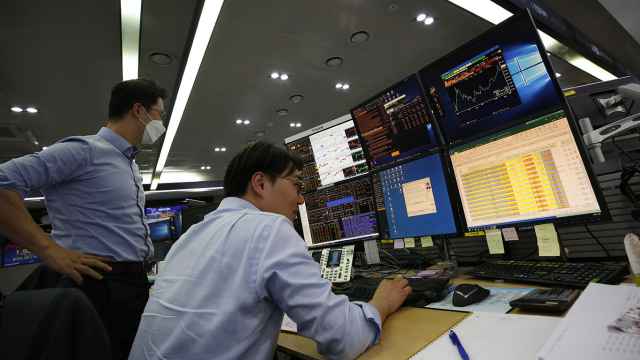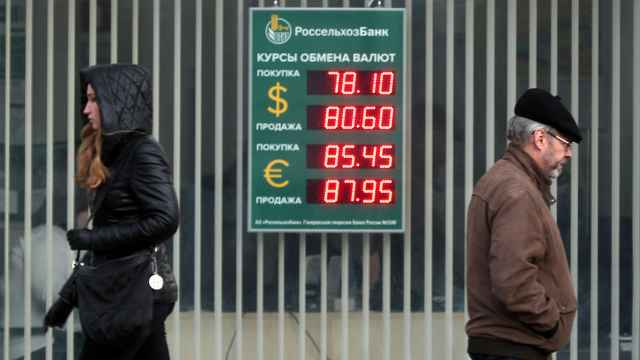The Russian ruble plummeted almost 10% Monday, falling to its lowest level in more than four years, as oil prices crashed following the breakdown of the Russia-Saudi Arabia pact to limit production.
The ruble was trading at 75 to $1 on Monday evening in Moscow — a 9.5% drop — after another wild start to the week for financial markets around the world.
Russia’s rejection of a renewed round of oil production cuts in the OPEC+ format at a crunch meeting in Vienna on Friday shocked the global energy markets and has prompted analysts to talk of an “oil price war” between two of the world’s largest energy suppliers.
Benchmark Brent crude oil fell more than 30% to a low of $31.02 a barrel when trading opened on Asian markets Monday morning — the sharpest one-day loss in almost three decades. It climbed back to around $34 a barrel by the time markets closed in the U.S.
Falling oil prices put the Russian ruble under pressure, as Moscow still relies on energy exports for a large portion of its budget. The so-called budget breakeven rate is $50, while profits on oil sold about $42 a barrel are funnelled into Russia’s swelling National Welfare Fund (NWF).
With prices below those levels, Russia will either have to run into its substantial coffers to fund day-to-day government spending or borrow more.
Russia’s Finance Ministry confirmed Monday it would sell foreign exchange reserves in a bid to stabilize the ruble, adding: “The value of liquid assets of the NWF and funds in the account for additional oil and gas revenues stand at more than 10.1 trillion rubles ($150 billion) or 9.2% of GDP. These funds are sufficient to cover the shortfall in income from falling oil prices to $25-30 per barrel for 6-10 years.”
Stable oil prices in recent years, coupled with President Vladimir Putin’s conservative economic management, have helped Russia amass significant international reserves and bring down its vulnerability to such kind of external shocks, analysts say.
“Russia is in a better position to fight this one than it used to be. Financial reserves are $570 billion — or almost $100 billion more than Saudi [Arabia]’s. Russia also has the flexible currency policy and will allow the rouble to fall into the mid-70s versus the dollar,” said analysts at consultancy firm Macro Advisory.
However, the economic impact of the coronavirus has tested that narrative. And now, analysts doubt whether Russia is prepared to spend billions of dollars of reserves to support its economy through a period of low oil prices in an apparent gamble to undermine U.S. shale producers.
“Russia’s problem is around its high cost production. Its oil industry faces acute risks if oil reaches $30. The government’s budget is more resilient, but a significant drop in prices will make it more difficult for Moscow to fund its National Projects, which are the centerpiece of its economic growth strategy,” analysts at Eurasia Group noted.
“The most likely outcome of this crisis is entrenchment into a painful process that lasts several weeks or months, until prices are low enough to change fundamental views in Moscow and Riyadh back to some form of compromise on resumed OPEC+ production restraint,” they added.
A Message from The Moscow Times:
Dear readers,
We are facing unprecedented challenges. Russia's Prosecutor General's Office has designated The Moscow Times as an "undesirable" organization, criminalizing our work and putting our staff at risk of prosecution. This follows our earlier unjust labeling as a "foreign agent."
These actions are direct attempts to silence independent journalism in Russia. The authorities claim our work "discredits the decisions of the Russian leadership." We see things differently: we strive to provide accurate, unbiased reporting on Russia.
We, the journalists of The Moscow Times, refuse to be silenced. But to continue our work, we need your help.
Your support, no matter how small, makes a world of difference. If you can, please support us monthly starting from just $2. It's quick to set up, and every contribution makes a significant impact.
By supporting The Moscow Times, you're defending open, independent journalism in the face of repression. Thank you for standing with us.
Remind me later.






